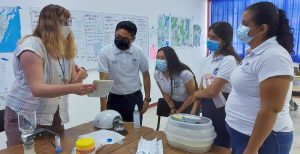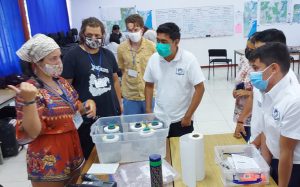Laguna Bacalar, Mexico’s second largest natural lake, is one of the most unique freshwater lakes on Earth. Part of an important ecological corridor, ranging from tropical forest to the Caribbean Sea, it is also threatened by economic development.
Last spring, six students from the University of Wisconsin–Milwaukee and one from the University of Wisconsin–Whitewater found out what it was like to study this one-of-a-kind ecosystem. They participated in a freshwater field experience established by the UWM School of Freshwater Sciences with support from the National Science Foundation’s International Research Experience for Students (IRES) Program. (For information on the fall 2022 semester experience, click here).

UW-Milwaukee, shares her
hydrology mapping research with
students at the Normal School.
The students — undergraduate and graduate students enrolled in diverse degree programs — spent six weeks conducting collaborative field research in Bacalar. Research topics ranged from mangrove forest biometrics to water quality mapping map to submerged vegetation analysis and more. Their research was overseen by scientists from ECOSUR, a public scientific research center focused on sustainable development in Mexico, Central America and the Caribbean.
“I felt so incredibly lucky to have this experience and collaborate with such knowledgeable and experienced faculty and local agency leaders,” says Rachel Clark, an undergraduate student in the Environmental Engineering program at UWM. “I was able to practice my Spanish and be in a wonderful culture in an incredibly unique ecosystem.”
Faculty from UWM’s School of Freshwater Sciences have been conducting research in Bacalar for years and had developed connections with the CREN Normal College, a teaching college in Bacalar. The NSF support allowed them to establish the Laguna Bacalar International Research Station and what will be an ongoing semester abroad experience for students enrolled at higher education institutions in Wisconsin and beyond.
“We now have a nice classroom and lab space at the Normal College,” says Jerry Kaster, professor emeritus at the School of Freshwater Sciences and the principal investigator on the NSF grant.
Last March, Kaster, fellow emeritus professors Val Klump and Tim Grundl, and Marissa Jablonski, executive director for the Freshwater Collaborative, traveled to Bacalar to sign the official documents for the program, set up the lab and introduce the UW students to scientists and mentors in Bacalar.
“Conducting research in a unique ecosystem, like Bacalar, is an amazing hands-on learning experience for students,” Jablonski says. “We look forward to promoting this program to UW students through the Freshwater Collaborative of Wisconsin.”
Amaranta Ramos Sánchez, an English teacher at the Normal School, was instrumental in organizing interactions between the UW students who were conducting field research and students from the Normal School who are training to become teachers.
The UW students learned how to better explain their research, and the Normal School students were able to practice their English language knowledge. At the end of the semester, students were paired up to create final presentations for each research project.
“The event was a big success, and all the students felt satisfied and proud of their performance and achievements. The linguistic and cultural exchange between the students proved to be a unique experience,” says Ramos Sanchez, who hopes to brainstorm additional ways to integrate the students during the semester.
For Maddie Burclaw, a marine biology major at UW-Whitewater who is considering future conservation work with the Peace Corps or the United Nations, the scope of the academic and cultural exchange was invaluable.

cultural exchange with students in Mexico.
“I’ve learned skills such as how to use different types of lab equipment, how to communicate on a cross-cultural level, and how to use my skills as a scientist and a humanist in order to brainstorm action plans for sustainable development,” she says.
With the program up and running, students will be able to participate in this study abroad exchange each fall semester. Applications for fall 2022 are being accepted June 1 to August 26. For information on the fall 2022 semester experience, click here.
Link to original story here.
